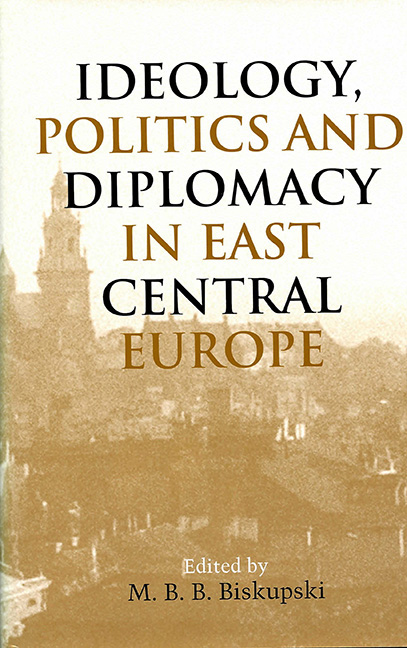Book contents
- Frontmatter
- Contents
- Preface
- Tabula Honoraria
- Piotr Wandycz
- Piotr Wandycz: An Appreciation
- 1 A Comparison of Czech Politics in Bohemia with Czech Politics in Moravia, 1860–1914
- 2 Strategy, Politics, and Suffering: The Wartime Relief of Belgium, Serbia, and Poland, 1914–1918
- 3 “This Troublesome Question”: The United States and the “Polish Pogroms” of 1918–1919
- 4 The Socialist Imprint on International Relations in Interwar Europe
- 5 Hungarian Americans during World War II: Their Role in Defending Hungary's Interests
- 6 The Nazi-Soviet Pact of August 23, 1939: When Did Stalin Decide to Align with Hitler, and Was Poland the Culprit?
- 7 Poland, the GDR, and the “Ulbricht Doctrine”
- Writings of Piotr S. Wandycz
- Contributors
- Index
Piotr Wandycz
Published online by Cambridge University Press: 11 May 2017
- Frontmatter
- Contents
- Preface
- Tabula Honoraria
- Piotr Wandycz
- Piotr Wandycz: An Appreciation
- 1 A Comparison of Czech Politics in Bohemia with Czech Politics in Moravia, 1860–1914
- 2 Strategy, Politics, and Suffering: The Wartime Relief of Belgium, Serbia, and Poland, 1914–1918
- 3 “This Troublesome Question”: The United States and the “Polish Pogroms” of 1918–1919
- 4 The Socialist Imprint on International Relations in Interwar Europe
- 5 Hungarian Americans during World War II: Their Role in Defending Hungary's Interests
- 6 The Nazi-Soviet Pact of August 23, 1939: When Did Stalin Decide to Align with Hitler, and Was Poland the Culprit?
- 7 Poland, the GDR, and the “Ulbricht Doctrine”
- Writings of Piotr S. Wandycz
- Contributors
- Index
Summary
In June, 1997, at my suggestion, the University of Paris I, Pantheon-Sorbonne, solemnly granted Piotr Wandycz a doctorate, honoris causa.
This reflected the fact that he is renowned in France among specialists in international relations, especially with regard to Central Europe. Beginning in 1962 with the publication of his book France and Her Eastern Allies, the eminent historian Jean-Baptiste Duroselle made Wandycz known to a generation of young historians, including Georges-Henri Soutou and myself. My personal relations with Piotr Wandycz go back a long time, and we have maintained this relationship through many meetings, most often in Paris, but at many other conferences as well, including one at Yale.
It is particularly noteworthy that his earliest works, written when relevant French, Polish, and Czech archives were not yet accessible, have retained all their scholarly value and have been only corroborated by documents which came to light when these archives were later opened.
Wandycz is a remarkable example of cosmopolitan culture in the best sense of the term. He is, of course, a man of Polish culture, but also French, as a result of his studies at the Université de Grenoble. He has had a career at the most outstanding American universities. He moves gracefully in all social circles in Europe and North America. As a result of his vast culture, he was able to write recently a remarkable synthesis of central European history. He deals with various national histories without any trace of bias. One cannot find in Wandycz any disdain for Poland's neighbors, the Czechs or Ukrainians, sentiments rather common among Poles. His scholarly work reflects the fraternity which has united the peoples of central Europe during their common search for liberty, a search often threatened.
Piotr Wandycz is not only a great historian; he is also a great humanist.
- Type
- Chapter
- Information
- Ideology, Politics, and Diplomacy in East Central Europe , pp. xi - xiiPublisher: Boydell & BrewerPrint publication year: 2003

